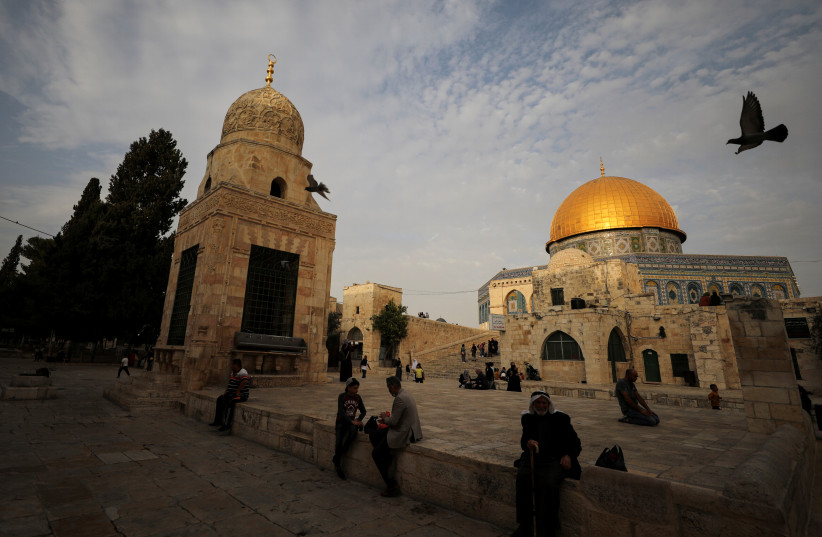“Is Jordan playing a double game?” Israel Radio asked Prime Minister Naftali Bennett on Wednesday.
The question followed a tumultuous week in which Temple Mount riots created a sudden rift between Jerusalem and Amman after a year in which both governments had worked to repair frayed ties.
The swift diplomatic whiplash took less than a month.
At the end of March, King Abdullah felt so comfortable with an open display of friendship with the Jewish state that he publicly hosted Israeli President Isaac Herzog for the first time.
All past visits between a Hashemite monarch and an Israeli President had been secret and were revealed only afterward.

It was a culminating moment, following almost a year of meetings between top officials and deals made on trade, water, and energy, to say nothing of Jordanian participation in an IDF aerial exercise.
Then, as if none of that had taken place, violence on the Temple Mount set a different tone.
Jordan summoned Israel’s ambassador, with the lower parliament calling for him to be recalled. Jordanian Prime Minister Bisher Al-Khasawneh praised “those who throw rocks at the pro-Zionists who are defiling al-Aqsa Mosque while under the security of the Israeli occupation government.”
To counter such statements, the Foreign Ministry distributed videos on social media that showed Palestinians attacking Jewish worshipers walking to the Western Wall in the Old City, and Palestinians throwing Molotov cocktails and stones from inside the Aqsa Mosque.
Jordanians and the Palestinian Authority, however, focused instead on images of Israeli police beating up Palestinian rioters, and Jewish worshipers attempting to pray on the Temple Mount. They charged that Israel was attempting to change the status quo, which forbids Jewish prayer there.
It is a particularly sensitive point for Jordan, which has a large Palestinian population, and whose Hashemite monarchy has a special custodial relationship with the Temple Mount that is ensconced in the 1994 peace treaty with Israel.
Violence on the Temple Mount has a direct ability to destabilize the monarchy, whose moderate rule is believed to be the heart of the relationship with Israel, and which helps guarantee Jordan’s role as one of Israel’s key security partners. Israel’s longest and most stable border is with Jordan.
Western and Gulf countries also depend heavily on the Hashemite monarchy’s rule of Jordan. They rallied this week around King Abdullah, with the US, European, and Gulf countries reaffirming Jordan’s connection to the Temple Mount. The United Arab Emirates also summoned Israel’s Ambassador.
The issue of the Temple Mount/al-Haram al-Sharif “is an issue that has public traction not just with the Jordanians, but all across the Arab world,” explained Ghaith al-Omari, a senior researcher at the Washington Institute. “In Jordan, what we saw over the last week were calls for demonstrations, calls for people to spend the night in mosques, and go for demonstrations after the morning prayer. So it is starting to take a grassroots level of agitation,” which al-Omari said has also been reflected in the Jordanian parliament.
Statements of support give the Hashemite Kingdom domestic ammunition, al-Omari said.
Externally, the Hashemite Kingdom is also worried that it might be replaced on the Temple Mount, or at least lose some of its hold there to other countries such as Saudi Arabia or Turkey, he said.
But despite the appearance of a crisis, the Hashemite Kingdom is not in danger domestically, and the fundamental elements of the relationship between Israel and Jordan have not changed, said al-Omari.
This latest crisis has not harmed the advances of the last year between Israel and Jordan, nor, he predicted, would it harm Israel’s normalized ties with Abraham Accord countries UAE, Bahrain and Morocco.
Moving forward, Jordan will get involved in Abraham Accord projects, but tensions with regard to Jerusalem and the absence of a resolution to the Palestinian conflict will continue to exist, and will at times generate a crisis.
“It would be a mistake to see this tension as if it is rejecting the trajectory of improvement,” Omari said. “The change is real.”
It is important to remember, he said, that everyone has to manage two sets of challenges both at home and abroad.
The dual situation facing the Hashemite Kingdom – that it must satisfy its constituents at home while creating a mutually regionally beneficial relationship with Israel – is not unique.
It is a kind of double game played by many leaders including Bennett, who is now in a coalition crisis in which he must satisfy the right-wing flank of his government by taking steps that will anger his Arab and Western partners.
These could include the advancement of settlement building and hooking up settler outposts to an electricity grid. It might also include the authorization of religious seminaries on the West Bank hilltop of Evyatar and Homesh.
Bennett himself heads a government that is forging ties with the Arab world, even though he disavows Palestinian statehood and refuses to talk with Palestinian Authority President Mahmoud Abbas.
In his radio interview on Wednesday, Bennett ducked the question of Jordan’s double game, answering that he was not giving it marks.
But if there is anyone who could understand King Abdullah’s complex diplomatic and domestic balancing act, it would be Bennett.
The events of the last week are an indication of how close Israel and the Palestinians are to a violent outbreak, and how critical events in Jerusalem play in maintaining or disturbing calm.
They are also a reminder of the potential danger of leaving the Palestinian conflict unresolved, particularly while moving forward with forging regional relationships.
In the absence of peace, however, all regional leaders are playing a double game, in which they will appeal for understanding as they inch forward by balancing domestic and diplomatic concerns.
